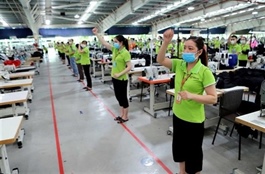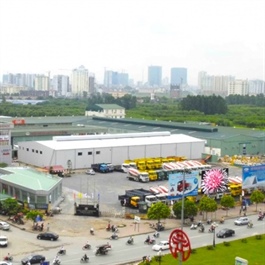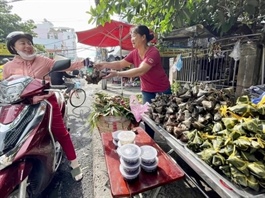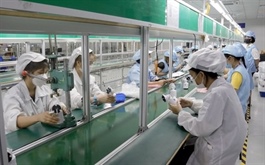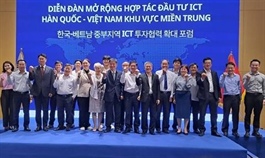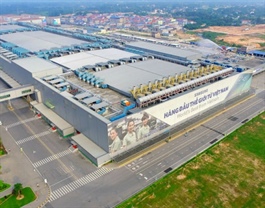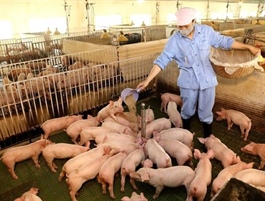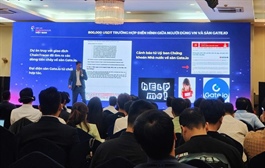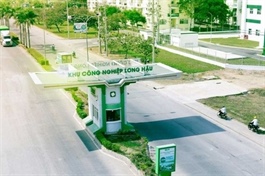Measures to boost organic and sustainable agriculture in the Northern Midlands and Mountainous regions.
Measures to boost organic and sustainable agriculture in the Northern Midlands and Mountainous regions.
Organic farming areas are often fragmented and lack sufficient barriers to prevent chemical contamination from neighbouring conventional farms, a conference recently organised at the National Agricultural Extension Centre, under the Ministry of Agriculture and Rural Development, heard.
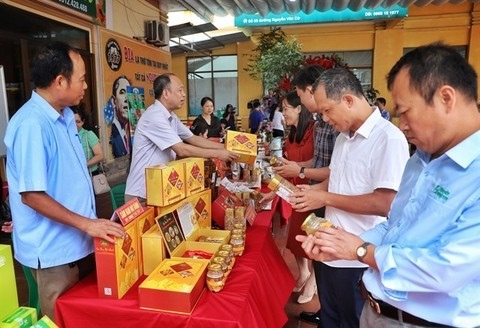
At the 2024 Agricultural Extension Forum in Bắc Giang Province. — VNS Photo |
Organised in collaboration with the Bắc Giang Department of Agriculture and Rural Development, the regional Agricultural Extension Forum heard that sustainable agricultural development was potentially highly lucrative in this part of Việt Nam.
The Northern Midlands and Mountainous regions are considered to have significant potential and advantages for developing organic agriculture, thanks to abundant soil, water and climate resources, supportive policies and increasing local expertise. The region is focused on integrated multi-value and sustainable agricultural development.
However, organic and circular farming areas are often fragmented and lack sufficient barriers to prevent chemical contamination from neighbouring conventional farms, particularly through irrigation channels. Additionally, small and scattered farming operations in this region must be transformed into concentrated production areas, ensuring water and environmental standards meet organic certification criteria.
In response to these challenges, the 2024 Agricultural Extension Forum aims to find policy solutions for organic and circular agriculture, strategies for production links and market expansion and methods to enhance capacity and communication for sustainable, value-driven organic farming.
At the forum, Lê Bá Thành, Deputy Director of the Bắc Giang Department of Agriculture and Rural Development, shared that Bắc Giang province has implemented various policies to promote organic and circular agriculture. These include linking production with consumption, supporting agriculture, forestry, and fisheries, providing seed support and encouraging OCOP product development.
Currently, the province has six certified organic farming models and several circular agriculture models, such as integrated pig and duck farming with vermiculture, combined poultry and organic fertiliser production, rice-fish systems and rice-mushroom-organic fertiliser production. These models have increased economic value by 12-300 per cent and reduced input costs by 10-30 per cent.
However, challenges remain, such as limited market differentiation for organic products, small-scale operations, a lack of diverse organic inputs, limited participation from businesses and residents and insufficient incentive policies.
Dương Thị Luyện, Chairwoman and Director of the Lục Trúc Bamboo Shoot Cooperative in Tân Yên District, Bắc Giang, shared that the cooperative has been actively building and developing its brand. They have registered the trademark 'Lục Trúc Bamboo Shoot' with the Intellectual Property Office under the Ministry of Science and Technology.

A stall exhibiting organic agricultural products at the Forum. — VNS Photo |
The cooperative has also signed contracts with reputable firms to protect their brand, including a recent contract with the Anti-Counterfeiting Technology Centre in Bắc Ninh in 2023. With these brand protection measures in place, the cooperative has participated in trade promotion conferences, engaged in e-commerce and collaborated with clean food stores. They are currently negotiating with several companies to export their products to Japan, the USA, and South Korea.
Đào Thanh Vân, Vice President of the Vietnam Organic Agriculture Association, shared international development experiences. He emphasised that developing organic agriculture requires linking production, processing and consumption chains to build markets, establish trust, and create high value for organic products.
Deputy Director of the National Agricultural Extension Centre Hoàng Văn Hồng collected feedback for the Ministry of Agriculture and Rural Development to adjust policies. He also urged provincial Agricultural Extension Centres to advise local leaders on promoting organic agriculture.
The forum underscored the importance of overcoming the current challenges faced by organic and circular farming in the Northern Midlands and Mountainous regions. By consolidating fragmented farming areas, enhancing market differentiation, increasing the participation of businesses and improving incentive policies, the region can fully harness its potential for sustainable agricultural development.
The active participation and shared experiences of various stakeholders at the forum highlight the collaborative effort needed to advance organic agriculture. As the region continues to develop its organic farming models and policies, the insights and strategies discussed at the forum will play a crucial role in shaping the future of sustainable agriculture in Bắc Giang and beyond.



